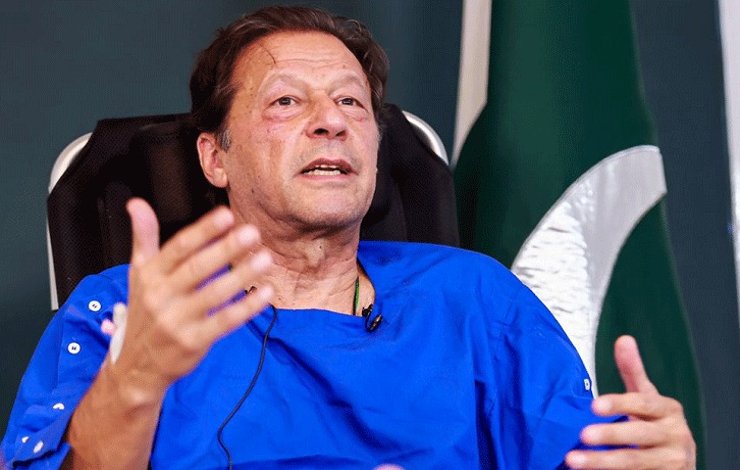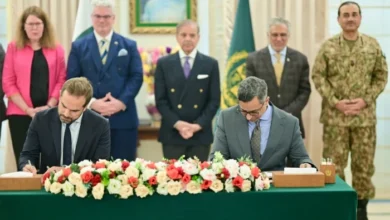Imran Khan: ‘Army Chief wanted to see Aleem Khan CM; establishment controlled NAB, anti-EVM’
Imran Khan made more revelations about the challenges he had faced during his tenure and blamed the establishment for controlling the NAB and showing opposition to EVMs.

Former prime minister and Pakistan Tehreek-e-Insaf (PTI) Imran Khan made more revelations about the challenges he had faced during his tenure and blamed the establishment for controlling the National Accountability Bureau (NAB) and showing opposition to the use of electronic voting machines (EVMs) while the army chief allegedly wanted to see Aleem Khan becoming chief minister (CM).
Imran Khan made the revelations during an interview with the leading English daily Dawn.
The PTI chief claimed that Army Chief General Qamar Javed Bajwa wanted him to appoint Aleem Khan as Punjab CM, whereas, he said that the establishment controlled the NAB to manipulate corrupt politicians and blamed GHQ for resisting the introduction of EVMs ‘as they make rigging impossible’.
“I am relieved to be alive,” Mr Khan said, in an exclusive conversation with Dawn.
It was surprising to see Mr Khan, who usually cuts a towering figure, hunched over a walker, and taking laboured steps to his sofa. His bandaged leg, where bullets had chipped part of his tibia, rested on a plush futon. One would think that the attack had shaken him. But Mr Khan was aggressive, said the author, adding Khan did not shy away from addressing the elephant in the room: his bad romance with the military establishment.
“I always imagined that, because the army is so powerful and organised, when I would try to bring rule of law in the country, they would play an important part,” Mr Khan said.
He repeated the mantras that formed the backbone of his 2018 election campaign and were the main obsession of his government: accountability of mafias; bringing the elite to task; ending corruption.
Who controls anti-corruption watchdog?
But he rued that the National Accountability Bureau was not in his control. “NAB was controlled by the army. I couldn’t do anything. They would say, ‘yes there are cases, we are working on it’. But nothing would happen. I discovered that, actually, the establishment controlled NAB and proceeded as it wanted… it was to control politicians by having files about their corruption. They would squeeze someone, but then he would be out on bail.”
Asked when it all started to go wrong between him and the army, Mr Khan said that his government’s failure to convict those whom he alleged of corruption was the first sign.
The second, Mr Khan said, was the choice of Punjab chief minister.
Aleem Khan as Punjab CM
“The army chief wanted me to have Aleem Khan [as CM Punjab] and I wouldn’t. Because not only were there NAB cases against him, he had occupied and sold land worth millions belonging to the government.”
When asked why he included Aleem Khan in his party if he suspected wrongdoing, Mr Khan said, “We always thought they were just allegations. And he defended himself. But when I asked the vice chairman of the LDA [about Aleem], he showed me on a map how Aleem Khan had occupied government land. This was around the end of my second year, and beginning of the third of my government.”
Mr Khan is unequivocal that, until the time that Gen Bajwa asked him to make Aleem Khan the chief minister, the relationship was going swimmingly.
“They were organised, you could get their help, we were on the same page regarding foreign policy. It was just the last six months, the issue of them making deals with these crooks when they should be behind bars…”
To emphasise his point about the military’s influence over accountability cases, Mr Khan said, “The army was going after these people before I came to power. 95 per cent of these cases preceded my government. The Nawaz Sharif case, the Avenfield case… he would not have got convicted had the army not provided the two brigadiers in the JITs — that was before me.”
Though Mr Khan points to the NAB inaction and Punjab CM issues as the main sticking points between him and the army, many speculate that it was actually his differences with the army chief over the appointment of the new DG ISI that marked the unraveling of the relationship.
“Look, I don’t know the internal politics of the army. All I know is our relationship was going well. Later, I discovered there was a big issue going on about the next army chief. I had never ever thought about who the army chief would be in November — why would I care, if it’s on merit? It should be the best person. It matters to the Sharifs and Zardari… but not to me.”
COAS appointment
But what about the perception that General Faiz Hamid was ‘his man’?
“Gen Faiz was the only general I knew, because he was working with me as the ISI chief… and I didn’t know anyone else. I told Gen Bajwa ‘I will take your recommendations because I don’t know the other guys’, but at the time my worry was Afghanistan. I feared it would go into civil war. And I felt Americans would blame us and we would be sanctioned. Ashraf Ghani told me there are 300,000 Afghan soldiers and they will be outnumbered. Not just Ashraf Ghani, ISI was telling us there will be civil war [in Afghanistan]. I wanted Gen Faiz to stay till the winter till the transition happened.”
Despite allegations that the 2018 elections were rigged, his opponents jailed or disqualified and sections of the media provided enthusiastic support, Mr Khan insists the establishment did not help him come to power. According to Mr Khan, he won because of his popularity, not because he was the military’s darling.
“The army did not back me in the 2018 election. I believe we won freely and fairly,” he said.
To illustrate his point, Mr Khan added, “Since I have been out of power in the last six months, out of 37 by-elections I have won 29. The establishment is openly supporting [my opponents], the government machinery is supporting them. Even the election commission is supporting them — despite that we have won 29 out of 37.”
EVMs
On elections and rigging, Mr Khan said his efforts to introduce electronic voting machines (EVMs) for the next elections were also resisted by the military.
“For two years, I tried to get EVMs. Rigging disappears when you have EVMs because all the rigging takes place after polling ends. It was resisted by both main parties because they have fake votes in most constituencies. It was resisted by the establishment, because then when it comes to manipulation, that’s the time to do it [during vote count]. Remember when Gen Bajwa said he got that call from Khawaja Asif asking for help when he was losing? The next day he won.”
When reminded that the allegations against his party’s victory in the last election were the very same, he said. “We lost 17 seats with less than a 3,000 vote margin… if they [establishment] wanted to help they could easily get those seats.”
He acknowledges that his razor thin majority was one of his biggest challenges, and, if he faced the same situation again, he would “never take government”.
“We didn’t have the power. This time, if I ever come, I will not take government if I don’t have majority and can’t make a difference. If you have a coalition, a thin majority, and are being blackmailed by your own people… it’s impossible [to govern]. That’s when the army’s role became more prominent, because we needed their help and we were working together for the same cause.”
So is he happy for the military to wield influence as long as it does as he says? “It would be idealistic to completely remove their role,” Mr Khan said.
“They have been in power for so many years, but there needs to be a balance. To think the army will be shunted out of politics is not possible. Using their constructive power can get this country out of institutional collapse.”



